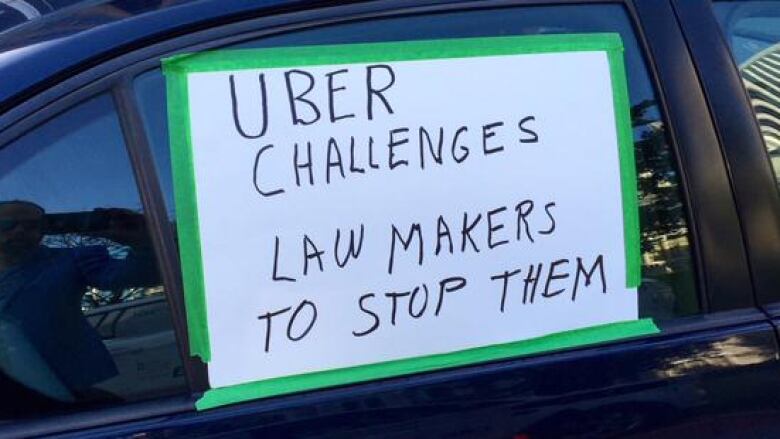Taxi review offers City of Ottawa advice on dealing with Uber
City could add ride-hailing services to taxi regime, create separate licensing or do away with plate limits

Consulting firmKPMGsaystheCity of Ottawa should consider new strategiesfor dealing withthe taxi and limousineindustry, saying the current model of licensed cabs and unlicensed ride-hailing companies should not continue.
"Going forward, continuing a substantialUberoperation outside the regulated environment is not an option," saidKPMGin its report into policy options released Wednesday.
The city's attempt to chargeUberdrivers for violating by-laws has not worked, the consultants concluded.
"Similarly, continuing the operation of the taxi industry in its current form should not be seen as an option either."
KPMG's three approaches, which are not mutually exclusive,are:
- Reform the current taxi regime to incorporate Uber-likeconcepts of driver rating and allow competition and reduced fares
- Establish a new "Transportation Network Company" licensing category forapp-based service models,such as Uber,tooperate in Ottawa
- Get rid of the limit on the number of taxi licence plates
Modernizing the existing industry, as in thefirst approach,could be difficult, the report said, because of limited competition among a small number of brokerages and collective agreements that limit innovation in customer service.
The second approach of bringing Uber and other services such as Lyftinto the regulatory foldhas worked well in other cities, according to KPMG.
Drivers with those serviceswould have to get police record checks and carry proper insurance an issue "at the core of public safety". They would not be allowed to use taxi stands or pick up riders who flag them down.
Allowing anyone who meets qualificationsto get a taxi plate the third option presents challenges, KPMGadmitted.
Those who currently own plates would suddenly have all value associated with their plate eliminated, which could cause hardship if they have outstanding debt from buying it, or are planning their retirement around it. Having Uber drivers put up roof signs and take training might discourage those part-timedrivers.
The reportaddressesseveral moreissues related to everything from public safety to how the fare structure could be changed.
Customers believe Uber serves them better
KPMG'sreport on policy approachesfollows sixbackground papers released in October thatcovered everything fromcurrent regulations and economics to emerging industry issues andcustomer experience.
"Based on the analysis to date, and input from the public and industry stakeholders, it seems clear that many customers believe they are better served by app-based service models, Uber specifically, than they are by the taxi industry," wrote KPMG in the report."Key differences are the lower price, convenience of the Uber app, and better customer service."
The strategies it suggests to update regulations could be affected by two private members' bills thathave passed second reading atQueen's Park, KPMG allowed.
Ottawa South MPP John Fraser has proposed increasing penalties for drivers who carry a passenger for a fee without a licence. MPP Tim Hudakhas proposed legalizing the sharing economy more broadly, including Uber but also AirBNB.
KPMG is seekingpublicinput via the City of Ottawa's websiteby Nov. 30.
Itsfinal report on the taxi and limousine industryis to besubmitted to the City of Ottawaby the end of December so councillors can determine future regulations in the new year.
KPMG Taxi and Limousine Regulation and Service Review (PDF 641KB)
KPMG Taxi and Limousine Regulation and Service Review (Text 641KB)CBC is not responsible for 3rd party content












_(720p).jpg)


 OFFICIAL HD MUSIC VIDEO.jpg)
.jpg)



























































































